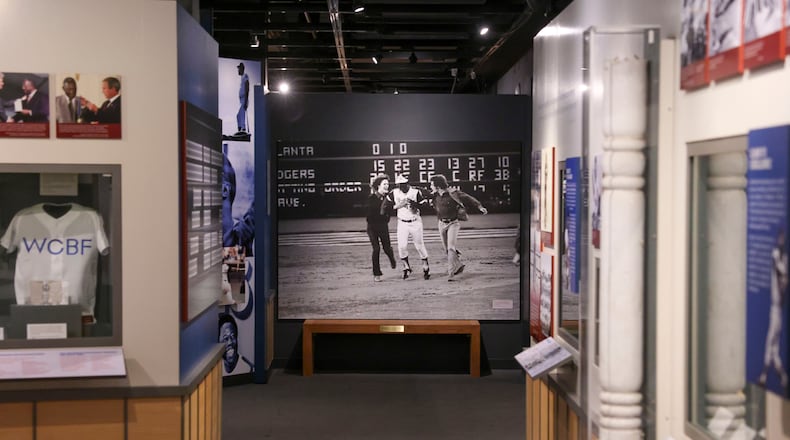In the latest twist involving a dispute about the home plate and the bases from Hank Aaron’s historic 715th home run, former Braves employee Ben Acree has filed a counterclaim against the team, alleging it has damaged his reputation.
In a filing Wednesday, responding to the Braves’ lawsuit against him, his father Bill Acree, also a former Braves employee, and Heritage Auctions, Ben Acree contends that the team exposed him to “public hate and/or contempt and/or ridicule.” He is seeking unspecified damages.
Counterclaims, such as the one filed by Acree in Cobb County Superior Court, are not unusual in such cases where civil defendants claim their reputations were defamed.
In his answer, Ben Acree denies all allegations about the memorabilia that were lodged in the lawsuit filed by the Braves.
Acree’s lawyer, Mark Spix, said in an interview with The Atlanta Journal-Constitution that he believes the Braves do not have a case.
Spix challenged the chain of ownership of the home plate and bases as the team has been sold several times since Bill Bartholomay owned the team at the time of Aaron’s home run, which broke Babe Ruth’s record.
“I don’t think they have a good provenance,” Spix said. “I don’t think they have a good claim of legal title. … What have they pled in that lawsuit that makes you feel so sure that all of this stuff really belongs to the current Braves?”
Bill Acree and Heritage have yet to file responses to the Braves’ lawsuit. According to Bill Acree’s attorney, Jerry Froelich, he expects to file a response soon.
Froelich told the AJC on Friday that the home plate and bases were gifted to Bill Acree.
“In 1974 when the home run was hit, Braves management wasn’t interested at all in the bases, and they gave them to him,” Froelich said. “They told him he could do what he wanted with them. He gave them to his son.”
The Braves contend that the bases were stored at Atlanta-Fulton County Stadium, Turner Field and Truist Park in the years following the home run.
A Braves spokesperson told the AJC Friday: “The evolving claims made by these former employees are wholly unfounded. We have statements from multiple sources who make it clear the bases are the property of the Atlanta Braves and were taken by former employees, one who is in violation of his separation agreement. Our goal is always to protect the legacy of Hank Aaron. We fully intend to assert our rightful ownership of this property which deserves to be proudly displayed at Truist Park in honor of Hank’s historic achievement.”
The Braves filed suit Sept. 27 and contended that the memorabilia were stolen, unlawfully possessed and attempted to be sold at auction. The team demanded that the items be returned by Heritage Auctions and seeks unspecified damages and a court order declaring the Braves the rightful owner of the home plate and bases.
Bill Acree began working for the Braves in 1966, holding several positions, including visiting clubhouse manager, home clubhouse manager, equipment manager, director of team travel and senior adviser. He moved into an advisory role in 2015. Ben Acree worked for the Braves from 1997 until 2016 as part of the home clubhouse staff, including equipment-manager duties.
In his counterclaim, Ben Acree contends the Braves, in an Aug. 16 letter to the parties, “knowingly and falsely or with reckless disregard as to the falsity” claimed the authenticity of the memorabilia had been misrepresented or that the items had been stolen and offered for sale to numerous third parties nationwide. This greatly harmed Acree’s reputation, the court filing said.
The memorabilia were part of Heritage Auctions’ Summer Platinum Night Sports Auction held in August. The items were obtained by a long-term Braves employee and gifted to his son, who consigned the items, according to the auction house description. The Braves sent a cease-and-desist letter to Heritage demanding several items of Aaron and other Braves memorabilia, including the home plate and bases from the historic home run, be returned. A copy of the letter was obtained by The Atlanta Journal-Constitution.
The home plate and the bases ultimately were pulled from the auction, but several other items were sold. Heritage subsequently filed a lawsuit in Texas against the Braves with four causes of action. They were defamation, business disparagement, intentional interference with contractual relations and intentional interference with prospective economic relations.
The Braves previously filed a motion to have the lawsuit filed against it by Heritage dismissed or moved to Georgia. The lawsuit was filed by Heritage in August in U.S. District Court in Dallas. The Braves’ motion claims the complaint should be dismissed for lack of personal jurisdiction over the organization or transferred to the Northern District of Georgia. The motion contends that the court in Texas does not have jurisdiction over the Braves. It also indicates that the Braves’ proof in the case is in Georgia, including witness residency and accessibility.
The Braves’ motion included references to the lawsuit filed against Bill and Ben Acree.
In the lawsuit filed in September, the Braves contend that following Aaron’s historic home run on April 8, 1974, the home plate and bases were stored in a built-in cabinet at Atlanta-Fulton County Stadium for 20 years until the Braves moved to Turner Field in 1997. They remained there for 20 years until the Braves moved to Truist Park in 2016 and were placed in a secured equipment room.
The Braves learned in August that items were being auctioned by Heritage and that the consignor was the son of a longtime Braves employee who allegedly gifted the home plate and bases to him in 2016.
The lawsuit states that Heritage initially refused to disclose the identity of the ex-Braves employee, but Heritage’s counsel ultimately confirmed “what the Braves already knew” that Bill Acree had the bases. The lawsuit states that through Bill Acree’s position as a senior adviser, which he held in 2016, he had access to the home plate and bases at Truist Park.
The lawsuit states that on Aug. 30, the Braves demanded the return of the home plate and bases from both Bill and Ben Acree and that each refused.
Heritage has declined comment on the case after the lawsuit filed in August.
The AJC first called into question the possible authenticity of the home plate and bases after reporting that the Baseball Hall of Fame has an Aaron display, since 2009, with the third base from the night he hit the historic home run.
The Hall of Fame first issued the following statement to the AJC when it contacted the museum about the auction. “The third base bag from Hank Aaron’s 715 home run game, which was presented to him following his record-setting home run, was then donated by Aaron to the Hall of Fame in 1982. He subsequently donated his entire collection to the Hall of Fame.”
The Hall of Fame does not have the home plate and first and second bases from the game. Lelands reportedly sold the second base from the game in an auction in 2002. The bat and ball from the historic home run are at Truist Park.
Heritage Auctions stood by the authenticity of the items in a previous statement to the AJC, and said it first heard of a potential issue in the AJC’s article.
Keep Reading
The Latest
Featured




